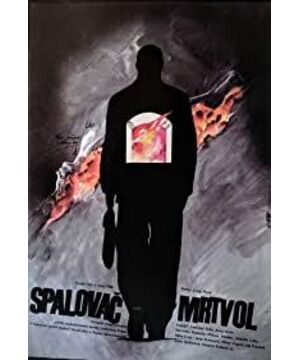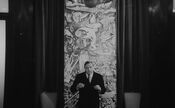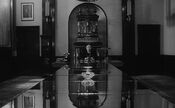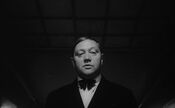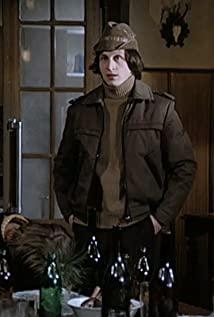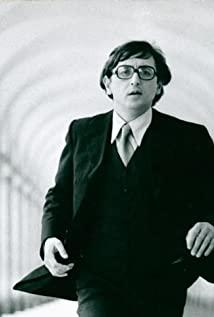At the end of the 1960s, Czech director Jorah Hertz made his three most famous masterpieces, "The Cremator", "The Kerosene Lamp" and "Magiana", and he said that only "The Cremator" was the most to his liking, as it was the least censored by the authorities, with only one scene that went against his own intentions. When the film started shooting, Hertz found himself in the golden age of his career, with absolute creative autonomy. In this film, Hertz flexed his muscles, "horror humor", "poetic expressionism", bizarre montage techniques, as well as rigid puppet-like performances, dense face close-ups, and a nightmarish overall atmosphere. These avant-garde and experimental novel methods have been used heartily, and the theme is black and suppressed, which makes the whole film have a seductive charm.
Carl: Angel or devil?
The story of The Cremator begins at the zoo. In front of him is the leopard that Rilke wrote about manic pacing in front of the fence, with beautiful patterns and fangs. Carl is playing in the zoo with his wife Lakme, daughter Gina, and son Miley. "My dear, this is the lucky place where we met seventeen years ago. Nothing has changed except the leopard. What we saw then has been liberated by the kindness of nature" --- Carl said to his wife, like a poet. "I always talk about benevolent nature, gentle destiny, God's sympathy, we judge others, blame them for these and those, but what about ourselves?" --- Carl said to his wife, like a philosopher. However, Karl is not a poet, but a senior director of a crematorium. Carl took his wife and children to a fun-filled mirror and said, "We are a decent and perfect family." However, the director used an ultra-wide-angle lens here, and the images of the family on the screen were distorted, which was a foreshadowing of the later black plot. What happened later really went all the way to twist and pervert. The Nazis invaded the Czech Republic and hunted and killed Jews. Karl's friend Walter was a Nazi loyalist. Walter pointed out that Karl's wife had half Jewish blood and half of his children. A Jewish blood, the Nazis asked Carl to draw a clear line with his family. In order to save his future and practice his own philosophy of death, Carl killed his wife and son one after another. Fortunately, the daughter escaped. The completely crazy Carl joined the Nazis and devoted himself to the Nazis with high fighting spirit. in the great cause of destruction.
A middle-class family of four that was supposed to be happy and peaceful, but suffered a catastrophe, and it was the parent Carl who created the catastrophe. Carl is an ordinary-looking fat middle-aged man, but he cannot be seen in appearance. If you put this person under a microscope and a strong light for a three-dimensional observation, you will find that this person is really intriguing and indescribable. Most obviously, Carl has a dual personality. 1. Loyalty and betrayal. Carl has a successful career, speaks softly, and has a strong sense of responsibility for his family (he often says to his wife: I can't do enough for you), he doesn't smoke or drink, and he seems to be a very decent and decent model husband. However, Carl was lustful, cheated on his wife, saw the beautiful crematoria cleaning lady, he touched her, and even flirted with her, trying to develop her into a mistress; Carl went to a brothel once a week, and he was in the brothel There is a fixed relationship, he said to the relationship: I have a beautiful and blessed home. 2. Strength and cowardice. Karl was usually strong towards his family and the workers in the crematorium. He insisted that the order was forbidden, but he softened in front of the Nazis. As soon as Walter put pressure on him, Karl betrayed the Jewish boss and employees. Karl, who did not drink alcohol at all. Abandoned principle at the Nazi celebration dinner and picked up the wine glass. 3, obsessed with death and attention to health. Carl is close to death, and has a small comb in his pocket. After combing the dead, he does not feel bad at all. He goes to the playground and visits various models that have died of illness with high interest. Carl, however, takes great care of his own health. He loves food and can eat biscuits with relish in crematoriums. He eats fish cleanly at Christmas and pays great attention to his health. He often sees a doctor and pays attention to health care. Before going to a brothel, he has to get a syphilis vaccine from the doctor. In addition, there are contradictory characters such as gentleman and rogue, gentleness and cruelty.
Carl's above-mentioned split personality still belongs to the "normal" range. What really made him go to a point of no return was a set of theories about death he believed in. Carl is very able to say that everything he encounters has a set of big truths, and he talks about it from time to time. In his theoretical system, the most peculiar theory is about death. For example, he said to Miley, "Children, there is nothing in life except death. What is certain", he also said to people that "no one can escape the timetable of death unless he is buried deep in the ground". ---The origin of Karl's death theory is the reincarnation theory of Chinese Tibetan Buddhism (Lamaism) he believes in. His book on Tibet is undoubtedly his personal "Bible", but in fact he completely distorted the Lamaism's theory. original intent. Karl took his "Bible" and advocated cremation, saying that in a crematorium, a body can be reduced to ashes in 75 minutes, while it takes 20 years of degradation in nature to turn into dust. The faster a person turns into dust, the better. Reincarnate as soon as possible, so cremation is a shortcut for the body to liberate the soul. In fact, Lamaism does not advocate cremation, but celestial burial. According to the teachings of Lamaism, after a person dies, the soul leaves the body and enters a new reincarnation, and the body is only useless like a piece of clothing, but feeding the body to the eagle after death is considered the last good deed of the human body, as "giving" alms Giving it to other creatures can be considered its final value. The celestial burial contains the Buddha's concept of compassion, love, benefiting the public, and almsgiving, and the cremation advocated by Karl obviously has nothing to do with the funeral rituals of Lamaism. Karl misrepresented a far-eastern religion to promote his own claims, using information asymmetry to deceive his audience, and his purpose was nothing more than self-interest. In short, Carr mentioned that Eastern sects are just using an exotic religion to put gold on their faces in order to sell dog meat more confidently.
Carl's obsession with death has nothing to do with religion, he's obsessed with the power that death brings to him. Carl has an authoritarian personality and likes to control others. 1. Carl likes to play with dead people, because he has complete control over them; 2. Carl likes specimens of flies, which is actually a hidden manifestation of his love for control. The flies that were originally flying were fixed in boxes by pins for people to enjoy. , Manipulation, manipulation is complete control; 3. We can also see Carl's desire for control through a meaningful little action. There are multiple scenes in the film showing that Carl likes to touch or pinches each other's neck when talking with people. This is true for wives, children, and employees. This little action is nothing more than to put the other party under his control. It is conceivable that once the other party is disobedient, the stroking will turn into a hard pinch. 4. Carl likes public speeches. Even at ordinary dinners, he can keep talking all the way. He likes to speak in the manner of preaching and the tone of the preacher. This is the case even in front of the boss. Karl's control of the right to speak is also a kind of control over others; 5. When Karl informs the Nazis, the first person he clearly informs is his Jewish boss. Obstacles to Crematorium Control. 6. There are portraits of foreign authoritarian figures hanging in Carl's house, which probably means "seeing the wise and thinking together". 7. Carl does not smoke himself, nor can he tolerate others smoking. At the banquet, he will forcibly extinguish the cigars from other people's mouths, which also shows his tyranny. ---This desire for control is, in the final analysis, a desire for power. With extreme power, one can control the life and death of others. Of course, Carl is only interested in influencing the death of others.
When Carl killed his wife, his wife was very cooperative. In the camera, Carl's round face was constantly approaching, and his wife stepped back. Carl didn't even threaten, but just talked leisurely, and his wife walked obediently to the noose. And Dvorak, a crematorium employee, also "consciously" hanged himself. It was Carl's two children, and it took Carl to kill one of them himself. The death of the two adults stemmed from their judgment on the situation at that time. The Nazis settled in, and the wind was terrifying. Karl was no longer alone. He had turned into a Nazi minion. Behind him was the huge killing machine of the Nazis, exuding the power of evil. Breath, Carl's colleagues have been betrayed by him before, and the remaining Jews are naturally not spared. Without Carl's identification, Carl's wife can "understand", step on the stool, and put on the rope loop. And Carl's sons and daughters are children who don't know the hardships and dangers of the world, they are ignorant, and they are not sensitive to the political climate at that time, so they ask Carl to do it himself. In order not to lose his power, Karl chose to sacrifice his family members. Although he did not join the Nazis, what he did was homogenous with the Nazis, reflecting the cold-blooded style of totalitarianism.
Karl had no political beliefs, and when Walter invited him to join the Nazis, he was not enthusiastic, he just left and right, saying: Eat some almonds. So why was he allied with the Nazis? Because the totalitarian union with the Nazis was a great opportunity for him to practice his philosophy of death. The Nazis murdered, and he came to burn the corpse. In his view, this kind of evil work was of great merit and a great act of kindness that opened the door to liberation for all sentient beings. When Karl and the Nazi leader talked about the high efficiency of the new incinerator, imagined the future, and entered a state of ecstasy, which is very different from his usual calm and gentle appearance, just because his great ambition is about to succeed, his theory will be in the Nazis With the help of a fish in water, he was able to run unimpeded, so he lost his way. When Karl killed his wife, this out-of-control speech reappeared, and the speech at his wife's funeral changed from a normal mourning to a Hitler-style manic high-spirited, which once again showed Karl's uncontrollable passion when his ideal was realized.
Why is Carl obsessed with sending people to incinerators? Carl's claim is: This can speed up the reincarnation of people. This is his half-knowledge of a foreign religion or even deliberately misinterpreting it. Of course, it is not the real reason. So what is the underlying reason? Try to analyze: 1. Carl has fought in the army, experienced war trauma, and witnessed humanitarian disasters. He has witnessed how life withered in large numbers, so Carl is used to death; 2. Carl has worked in crematoriums for many years, Witnessing all kinds of deaths, he saw that no matter how beautiful life is, it is always very fragile. He repeatedly mentioned the death of a beautiful woman who was about to get married; 3. Carl saw murder models and deformed models in the playground , venereal disease models, from these models, he saw all kinds of human sins, corruption, ugliness and disgust. 4. Karl also has fallen people around him, like the morphine-addicted employee. ----What Carl saw was the impermanence of life and the disaster of human nature. The body is not worth lingering on, it is just a camp where suffering is stationed. A fire in the hearth can cleanse the sins of the world and end the suffering of the world. The faster the human body is When things turn into nothingness, all kinds of unhappiness attached to people will disappear sooner. Carl always talks about a free, pure soul without pain, can we think that Carl has a perverted mental cleanliness that makes him an enemy of the flesh, and in his view, burns the world , the world is quiet.
During the French Revolution, Madame Roland was taken to the execution ground. The hero of the female middle school left a famous saying: Freedom, how many crimes are committed in your name. ----The word "freedom" in this famous saying can also be replaced by other beautiful words, such as "justice", "democracy", "national pride", "redemption" and so on. Because of grievances and hatreds, the number of people who are killed is always limited. If people are killed because of a grand idea, then the victims are thousands of people. Carl wants to use his philosophy of death to save all beings, when in fact he is doing evil. Although the world is dirty and life is painful, everyone has the right to choose to live or die. Coming more and more, depriving others of the right to choose, and killing people in the name of redemption, Karl is undoubtedly the epitome of all dictators. This dangerous murder theory also has a distinctive feature, that is, continuous self-beautification, deification, and sanctification. Every time Karl kills, a Tibetan lama will appear. This priest looks exactly like Karl. Karl said: "The throne of Lhasa is waiting for you" "You are the incarnation of Buddha", under this kind of self-hypnosis, Karl felt that he had a long way to go, "I will save everyone, the whole world!". So Karl fell deep into the mud, never returned, and escaped into the devil's way.
As the saying goes, hooligans are not scary, just afraid of hooligans being literate. Carl is also such a gentle hooligan, sanctimonious and gentle, but with hidden murderous intentions. He is a dangerous person with a set of self-contained theories. He can use this theory to destroy and kill, and he can beautify it as redemption and liberation. . The Eastern doctrine of reincarnation was originally the Mahayana Dharma to purify all living beings, and Karl twisted it into an excuse for murder. Just as Hitler decorated his dictatorship with national socialism, hooligans have no reverence for culture. Hitler is a great dictator, Karl is an ordinary person, and once ordinary people have a set of evil theories and do evil things in the name of gods, ordinary people will become tyrants. The director seems to be using the character of Carr to warn people to be wary of any seemingly wonderful theories of salvation.
Symbol The symbolism of this
film is used more, but the meaning of the symbol is not difficult to understand. Those symbols are more interesting than philosophical.
The animals in the zoo are ferocious, and the fangs and tongues of the animals and the faces of the animals are alternately presented, which points out that there are many animals left over from the brutality of human beings.
Boxing is a manifestation of the human instinct to kill.
The repeated appearance of a black-clothed beauty holding a flower is nothing more than a little bit of human conscience, as an external observer, supervisor, and warning, but the beauty is powerless, she does not have the shocking effect of the sword of Damocles, she It just appeared, but it was silent. In the end, she tried to grab Carl in the car, but was thrown far away, suggesting that the only god left in Carl's heart was extinguished.
The red-clothed lama in Carl's hallucination is nothing but self-hypnosis and self-comfort after his murder, in order to reverse the guilt to the divine, so that he can feel at ease and complacent.
Carl wanted to kill his daughter, but the daughter ran away. The daughter symbolized the hope of mankind. The daughter did not succumb to the tyranny of her father, indicating that there will always be people who will rise up against tyranny. Furthermore, it is the daughter who is fleeing, and there is a metaphor that a daughter can have children and become mothers, implying that the bloodline of human resistance against tyranny will not be cut off.
music. The psalms sung at Jewish gatherings are mournful and heart-wrenching. The Hebrew Bible contains Lamentations, which the Jews wrote to commemorate the destruction of Solomon's Temple by Nebuchadnezzar and the destruction of the "Second Temple" by the Roman general Titus seventy years later. I don’t know if the Jewish rabbi sang at the meeting was one of Jeremiah’s lamentations, but its desolation and depression were like a lamentation. The lamentation expresses the thoughts of the homeland and the pain of losing the country. Obviously, the Czech Jews felt that the storm was about to come, and their homeland was about to be devastated again. The Jewish song is a metaphor that this troubled nation will experience another bitter storm. The music that accompanies Carl is a high-pitched female voice. Although it is only a single "ah" character, it is sometimes eerie, sometimes brilliant, sometimes ethereal, sometimes high-pitched and full of expressiveness. And when Karl murdered and described the glorious prospect of the crematorium, the background music was very intense, like an opera sung to the sky, which reminds people of the Nazis playing Beethoven, Wagner, Strauss in the concentration camps every day. A feast needs splendid music to accompany the meal. Many Nazis are music lovers, and some are quite appreciative. It is said that Kemera, the commander of the Auschwitz concentration camp, would cry when he heard Schumann's "Fantasy". Karl repeatedly mentioned that he liked music, another intersection between him and the Nazis. But Karl is obviously like the Nazis. Musical literacy does not make him kinder, and music is just a tool to add fun when doing evil. These lingering long notes, although very beautiful, can send chills down the spine, because when the music rises, "evil" is also breeding or raging. These misplaced soundtracks suggest that music is nothing more than Karl's feathers of sin (as Karl so often refers to Eastern religions).
The symbolic metaphors in Jorah Hertz's other works are also quite shallow. In "Ferrat the Vampire", a racing car is set as a vampire. Only by sucking the blood of the driver can it run fast, pointing out the blood-sucking nature of modern industry. , devastating.
where is the humor
Jorah Hertz said that he tried a kind of "horror humor" in this film, but I believe that many people who have seen the film will only feel horror, where is there any "humor". Hertz said: "I've been to cinemas in many countries, and I've seen different reactions to the film [referring to The Cremation], the Netherlands, Italy..., in Prague, the audience is frustrated, in Slovakia, they laugh, in In the Netherlands, it seems that the film is a comedy from beginning to end, and in Italy, the audience directly came out of the cinema, and they could not accept cremation after death!" ----The difference in cultural context led to the audience's humour in the film. Understand the difference. The humor in The Cremator isn't as overtly comical as the slapstick slapstick in The Ninth Heart, but if you pay attention, you can still find some hints of humor.
First, Karl hired two new employees, one called Strauss and the other called Dvorak. The two sad little people used the names of two big musicians, which was quite a joke.
Second, when Carl made some high-sounding remarks, pictures of naked women flashed in his field of vision. The director used this dislocation and dislocation of words and deeds to show his duplicity and disdain seriousness with jokes.
Third, during the boxing match, the nervous woman was always worried that the boxers would hit the referee. Her husband insisted that it was impossible, but just after the words fell, a boxer made a mistake and knocked the referee down. This is a fairly obvious joke.
Fourth, Karl's friend Walter kept instilling Nazi theories to Karl during the banquet, but Karl was distracted. He lowered his head and peeked at prostitutes and Nazi leaders in public. The iron-blooded theory is no match for the lewd scene, where the director dispels the so-called "serious and sacred" of the Nazi theory, making it a joke.
Due to the estrangement of the time background and cultural background, it is still quite difficult to find and understand the humor in the film. The comedy elements that the audience could understand and empathize with in those days seems to be too obscure and distant now. In that kind of political pressure And the pitiful humour that emerges from cultural coercion, which we fail to grasp, is more of a blessing than stupidity.
Jorah Hertz
Jorah Hertz is an outlier in the Czech New Wave cinema, he himself is not on the New Wave's list, but his films do appear in the New Wave masterpiece list. The director's life situation is quite strange. He first wanted to be a comedian and went to the Bratislava Art School to study, but he failed the acting exam. The examiner told him that you look bad to the audience. Depressed Jorah Hertz turned to the puppet department and learned nondescript puppets. When Hertz was studying in the puppet department, students from FAMU (Department of Film and Television of the Prague Academy of Performing Arts) often showed movies. He also ran to see them, but was blocked by the door. He had to sneak in after turning off the lights and watched a lot. American films, German films, Swedish films, and Spanish films, which provided him plenty of nutrition for his own filmmaking in the future. Buñuel's Illusionism and German Expressionism. The style of Hertz's films is famous for being fantasy, and has little to do with the new wave of French realism, and the New Wave camp in his country does not accept him. Hertz often says that he does not belong to the Czech New Wave, but prefers Niles and Skom. Etc., but film historians still classify him as the Czech New Wave. After all, he has a lot of intersections with FAMU members, and is surrounded by the trend of the times. It is impossible not to be marked by the mainstream at that time. When it comes to the Czech New Wave who are good at fantasy style and fables, Vera Zitilova and Jan Nemets are masters among the main generals, and Hertz is not alone. Hertz's alternative is his independent attitude and eccentricity. Made by birth.
In addition to pioneering creative methods, Jorah Hertz has received international accolades for Czech cinema. "Magiana", according to Hertz himself, was only a work of practicing hands, but it won the Golden Hugo Award in the United States. "The Burning Man" won the Best Cinematography Award and the Best Actor Award at the Spanish Fantasy Film Festival in 1972. "Passage", which was filmed in his later years, was very popular at some overseas film festivals. The film was called "Bergman and Fellini's handshake" and "the best Kafka film in history".
In addition to the trophy, Hertz also received an alternative honor: being plagiarized. Hertz was in a concentration camp when he was ten years old. Once, the Nazis ordered them to take off their clothes and take a bath. They were extremely panicked, afraid of the poison gas coming out of the tube, and the water came out of the tube, not poison gas, and they cried with joy. Hertz used this experience in the film "The Night Catches Me", and Spielberg, the great American director and senior copywriter, transferred this scene to "Schindler's List" without missing a single shot. Hertz said: "If I file a lawsuit, I will win. But Hertz spared Spielberg and didn't sue him. Of course, people can call Hertz "a director copied by Spielberg" in the future, which would be a compliment.
Thrush shade
In the era when Hertz was making films, literature and art were very strictly imprisoned under political pressure. The directors’ films were either banned or deleted beyond recognition. It can be said that the films of directors with a little artistic conscience and artistic courage at that time would always encounter unexpected events, and a rule can be drawn: directors who are not banned are not good directors. In such a perverted atmosphere, the Czech New Wave must not imitate the French way of pursuing the real New Wave, otherwise the Czech New Wave will never come out. The technique is introduced into the film, and the tortuous expression of his artistic pursuit. There are also directors on the fringes of the new wave like Hertz, who also play tricks in order to make a movie that suits their own minds, such as the so-called "horror humor" he invented, which was originally intended only to get away with censorship; in terms of script, He said: "There are two scripts for almost every film I make, one is first passed the review, but I don't shoot it, and the second is my own, I shoot halfway through it and need a second time. censorship, so they will take and cut off a lot of undesired parts.” ---Directors always have to hide from the censorship department of the authorities, and when making a film, they always have to worry about "thrush in depth". Despite the constant clanging of shackles, the Czech New Wave flourished in 1962-1968, producing a number of masterpieces. Until August 1968, Soviet tanks entered Prague, crushed the soul of poetry, and the Czech New Wave was destroyed. After the Soviets came, Hertz changed the ending of "The Cremator": two cremators were sitting in a cafe, a Soviet tank was driving through the back window, and the two were talking about Karl, this is a good man, he What's going on, the next shot is that the museum is ruined, people's sad faces are reflected in the windows, and Carl comes back laughing. --- Of course, the end of this taboo was destroyed by corpses. After the Soviets came, they centrally managed the Czech literary and artistic circles, directors were banned from making films, many directors went abroad, Milos Forman and Jan Kadar went to the United States, and Hertz went to Germany.
Different from the French and German New Waves, the Czech New Wave does not play breaks and rebellion, they are not anti-traditional, and the artistic bloodline maintains continuity. When faced with the same political pressure, the artists did not demolish each other, but joined together to take care of reality with art and perform tortuous political allegory. Today, the Soviet Union has gone with the wind, but the Czech New Wave films have radiated splendor and have been re-understood and applauded by people. Art always outlasts the regime.
View more about The Cremator reviews


